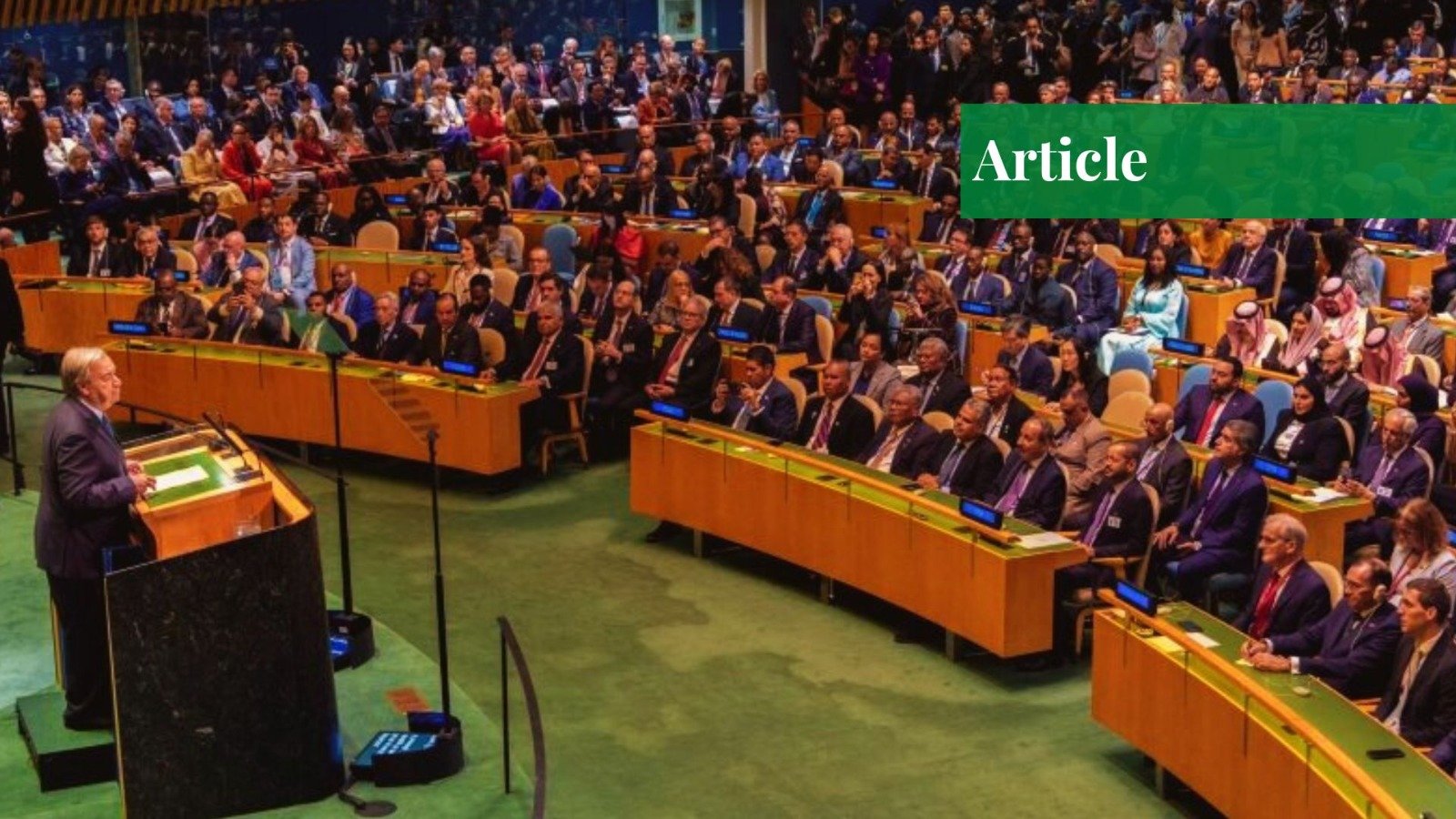Introduction
Amidst severe geopolitical stress and urgent transnational issues, the 80th session of the UN General Assembly (UNGA 80) took place in September 2025 at UN Headquarters in New York. The meeting, which coincided with the UN’s 80th anniversary, brought together heads of state, foreign ministers, and leaders of civil society to discuss a wide range of topics, including climate finance and adaptation, global governance and great power competition, nuclear proliferation, large-scale humanitarian crises (such as the Gaza war and protracted displacement crises), and emerging governance issues brought on by artificial intelligence (AI). Annalena Baerbock served as the assembly’s president for this session.
Themes and the Architecture of the Debate
In addition to the high-level week and the general debate, UNGA 80’s formal program featured special plenaries and thematic gatherings that sought to turn rhetoric into practical collaboration. These included sectoral events on AI, climate finance, and humanitarian response, as well as an 80th anniversary commemoration. As per the Council on Foreign Relations, the media confirmed what analysts and policy institutes had predicted: the majority of high-level interventions would focus on a few interconnected themes: climate and “loss & damage” finance; the humanitarian and legal aftermath of the Gaza war; Russia-Ukraine and European security; the competition for great power governance (particularly the dynamics between the United States and China); nuclear proliferation issues (including North Korea); and the need for UN reform and renewed relevance.
Climate Justice and Finance: Wealthy States Under Scrutiny
Developing and small island governments made one of the strongest and most persistent complaints during the 80th session of the UNGA, accusing affluent countries of not fulfilling their climate finance pledges and of providing inadequate and difficult-to-access funds for adaptation and loss and damage. As Reuters reported, the debate was framed as one of existential equity rather than an abstract technical issue by delegations from low-lying island states, African Sahel nations, and climate-vulnerable regions.
They claimed that inadequate or delayed disbursement of promised funds exacerbated vulnerability, caused displacement, and undermined developmental gains. Several donor nations declared increases in bilateral contributions and commitments, but civil society and a number of delegations felt that these actions were insufficient given the magnitude of the effects.
Humanitarian Crisis, Gaza, and the Law of War
The war in Gaza dominated much of the moral and political energy of the General Debate. According to Al Jazeera, many member states, humanitarian organizations, and UN officials used their time to demand immediate access for relief, clearer protection for civilians, and adherence to international humanitarian law during the 80th UNGA session. The General Assembly and a number of high-level speakers also called for mechanisms to ensure accountability for alleged violations.
Media synthesis of national statements highlighted wide divergence—while some states emphasized Israel’s right to self-defense and the need to counter terrorism, others foregrounded an immediate ceasefire and unimpeded humanitarian corridors. The intensity of the debate underscored the limits of consensus in the General Assembly when great power alignments intersect with deeply polarized regional politics.
AI Governance: From Technical Novelty to Diplomatic Priority
AI governance was a more recent but quickly rising topic on the table. According to PBS News, unchecked development of powerful AI systems might increase disinformation, facilitate mass monitoring, and worsen inequality, the secretary-general and several member nations emphasized. In response, the UN started a “Global Dialogue on AI Governance” and multilateral talks with the goal of uniting states, tech companies, and civil society around a common set of rules and protections. Delegations discussed how to balance innovation with accountability procedures and human rights safeguards; this topic is expected to spark further discussions after Assembly week.
Security Flashpoints: Ukraine, North Korea, and Nuclear Questions
Reiterating long-standing worries were security-related issues in the the 80th UNGA session. As mentioned by the Guardian, Pyongyang’s return to the podium indicated continued opposition to denuclearization negotiations, while Ukraine’s cause was highlighted as leaders reaffirmed support for sovereignty and rules-based order. In statements that complicate diplomatic possibilities and heighten pressure for international engagement, North Korean officials made it apparent that they saw their nuclear posture as crucial to sovereignty and deterrence. A larger trend towards the securitization of the General Debate in 2025 is shown in the reappearance of nuclear-related questions in speeches.
Institutional Reform and the Call for Leadership Renewal
The anniversarial setting of UNGA 80 prompted introspective discussion regarding the UN’s adaptability. Several high-level speakers both inside and outside the assembly, as well as observers from policy institutes, called for structural reforms, including better coordination throughout the UN system, more effective budgeting, and increased efficacy in humanitarian relief and conflict prevention.
As mentioned by Reuters, advocacy for alternative leadership styles at the UN, including public requests from some quarters for the UN to explore female leadership at the highest level of the organization, emerged as a theme throughout the session and was extensively reported by the international media. These discussions intersected with political struggles for power and members’ ability to convert resolutions into legally binding results.
Human Rights and Protracted Crises Beyond Headlines
The General Assembly had significant sessions on other persistent humanitarian crises, particularly the predicament of the Rohingya and other minorities, in addition to the well-known flashpoints. While the international media spotlight was on Gaza and great-power rivalries, high-level plenaries and briefings aimed to keep the focus on protection, documenting of abuses, and long-term solutions. This illustrates the United Nations General Assembly’s dual nature as a venue for high-profile diplomacy and a forum for ongoing normative work on underappreciated crises.
Analysis: Strengths, Limits, and What to Watch Next
Since practically every sovereign state is given a platform, the 80th UNGA session reaffirmed the General Assembly’s unique legitimacy as the most universal deliberative body in the world. As mentioned by the Council on Foreign Relations, this breadth generates political and moral pressure that other institutions are unable to match. However, the session also revealed functional limitations, including the ongoing disconnect between rhetoric and resources, disagreements among powerful states, and the absence of legally binding enforcement measures in the General Assembly’s toolkit.
The upcoming months will demonstrate if the high-level pledges made on issues like climate finance, humanitarian access, AI governance, and gradual UN reform are reflected in institutional frameworks, budgets, and long-lasting diplomatic agreements. Assessing the future efficacy of global governance requires keeping an eye on these follow-throughs as well as the changing alliances between the United States, China, Europe, and regional blocs.
Conclusion
In light of the pressing humanitarian crisis, growing technology risk, extreme climatic stress, and escalating geopolitical competition, the 80th UN General Assembly functioned as a gauge of current global affairs. The 80th UNGA session is educational for international relations students because it both demonstrates the practical limitations that prevent collective action and the normative advantages of multilateralism. Whether or not promises are operationalized into financing, legal protection, governance structures, and diplomatic channels that lower risk and protect people will determine the session’s final significance, not the remarks made in New York.
If you want to submit your articles and/or research papers, please visit the Submissions page.
To stay updated with the latest jobs, CSS news, internships, scholarships, and current affairs articles, join our Community Forum!
The views and opinions expressed in this article/paper are the author’s own and do not necessarily reflect the editorial position of Paradigm Shift.
Ayesha Saeed is an international relations graduate with a strong interest in diplomacy, global politics, peace and conflict studies, and climate change. Her work focuses on research and understanding how international systems affect global peace and sustainability. She is especially interested in how countries cooperate to solve issues like conflict and climate change.



